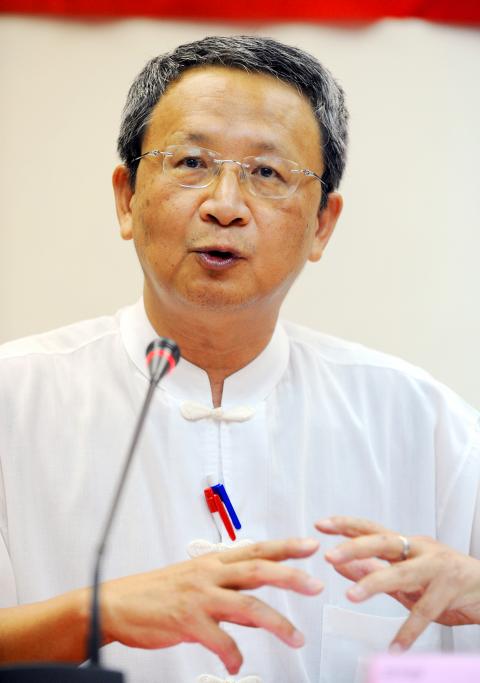Democratic Progressive Party (DPP) lawmakers yesterday criticized a government-sponsored study of the 228 Massacre in 1947 that blamed the Presbyterian Church for the riot, whitewashing the responsibility of Chiang Kai-shek’s (蔣介石) regime.
The study conducted by Chu Hung-yuan (朱浤源), a research fellow at Academia Sinica’s Institute of Modern History, received a grant of NT$500,000 from the government-affiliated Taiwan Foundation for Democracy, part of the organization’s regular sponsorships of academic studies.
In its defense, Taiwan Foundation for Democracy chief executive Huang Teh-fu (黃德福) said Chu’s study represented his personal views and that it was not the position of the organization because it was a grant-maintained study rather than a project undertaken by the organization.

Photo: Lo Pei-der, Taipei Times
Chu published his research in November last year in Washington and said he had made five breakthroughs.
The first was the use of personal testimony by Hsu Hsueh-chi (許雪姬) and other researchers, which the Research Report on the 228 Incident published by the Executive Yuan in 1992 was based on, was likely to include “unnecessary emotion.” The second was the key role of the underground Chinese Communist Party. The third was the intervention of “hawkish” figures from the US. The fourth was the exceptionally small number of military personnel stationed in Taiwan at the time and the fifth was the Presbyterian Church’s “wide participation in the attacks.”
Huang was bombarded with questions from DPP lawmakers regarding the study at a meeting of the legislature’s Foreign Affairs and National Defense Committee.
“How could you not know what role the Presbyterian Church played in the democratization process in the country? Chu admitted that he wasn’t able to access the Presbyterian Church’s files. Given that, how could he come to the conclusion he did?” DPP Legislator Hsiao Bi-khim (蕭美琴) asked.
Huang said the conclusion was also “to our regret,” adding that the foundation would upload the research online so that it could be subject to scrutiny.
DPP Legislator Tsai Huang-liang (蔡煌瑯) said Chu’s research distorted the facts of the incident and that it could cause serious damage to families of the victims of the incident, creating confrontation between Taiwanese and Mainlanders.
“The research is unacceptable. It attributed the uprising to incitement initiated by the Presbyterian Church and local ruffians and to infiltration by the Chinese Communist Party. Even former president Lee Teng-hui (李登輝) was an instigator. How can we accept such baseless conclusions?” Tsai asked.
Citing an example of the so-called “new findings” in Chu’s research, Tsai noted an incident whereby a group led by the Presbyterian Church attacked Mainlanders in Changhua County and robbed their textile factory.
“Is this true? Did people see the Presbyterian Church lead the killers? Why haven’t we seen similar descriptions in previous research?” he asked.
Chu has a history of causing controversy when commenting on the 228 Incident.
In 2007, he said the Japanese colonial government was to blame for the violence, rather than Chiang, because the Japanese deliberately created inflation before they handed Taiwan over to the Chinese Nationalist Party (KMT) to provoke public resentment of Chiang’s regime.
The 228 Incident was a Japanese “premeditated economic attack” on Taiwan, Chu said, adding that the US was complicit in the 228 Incident because it had planned to bring Taiwan under its mandate.

The CIA has a message for Chinese government officials worried about their place in Chinese President Xi Jinping’s (習近平) government: Come work with us. The agency released two Mandarin-language videos on social media on Thursday inviting disgruntled officials to contact the CIA. The recruitment videos posted on YouTube and X racked up more than 5 million views combined in their first day. The outreach comes as CIA Director John Ratcliffe has vowed to boost the agency’s use of intelligence from human sources and its focus on China, which has recently targeted US officials with its own espionage operations. The videos are “aimed at

STEADFAST FRIEND: The bills encourage increased Taiwan-US engagement and address China’s distortion of UN Resolution 2758 to isolate Taiwan internationally The Presidential Office yesterday thanked the US House of Representatives for unanimously passing two Taiwan-related bills highlighting its solid support for Taiwan’s democracy and global participation, and for deepening bilateral relations. One of the bills, the Taiwan Assurance Implementation Act, requires the US Department of State to periodically review its guidelines for engagement with Taiwan, and report to the US Congress on the guidelines and plans to lift self-imposed limitations on US-Taiwan engagement. The other bill is the Taiwan International Solidarity Act, which clarifies that UN Resolution 2758 does not address the issue of the representation of Taiwan or its people in

US Indo-Pacific Commander Admiral Samuel Paparo on Friday expressed concern over the rate at which China is diversifying its military exercises, the Financial Times (FT) reported on Saturday. “The rates of change on the depth and breadth of their exercises is the one non-linear effect that I’ve seen in the last year that wakes me up at night or keeps me up at night,” Paparo was quoted by FT as saying while attending the annual Sedona Forum at the McCain Institute in Arizona. Paparo also expressed concern over the speed with which China was expanding its military. While the US

SHIFT: Taiwan’s better-than-expected first-quarter GDP and signs of weakness in the US have driven global capital back to emerging markets, the central bank head said The central bank yesterday blamed market speculation for the steep rise in the local currency, and urged exporters and financial institutions to stay calm and stop panic sell-offs to avoid hurting their own profitability. The nation’s top monetary policymaker said that it would step in, if necessary, to maintain order and stability in the foreign exchange market. The remarks came as the NT dollar yesterday closed up NT$0.919 to NT$30.145 against the US dollar in Taipei trading, after rising as high as NT$29.59 in intraday trading. The local currency has surged 5.85 percent against the greenback over the past two sessions, central